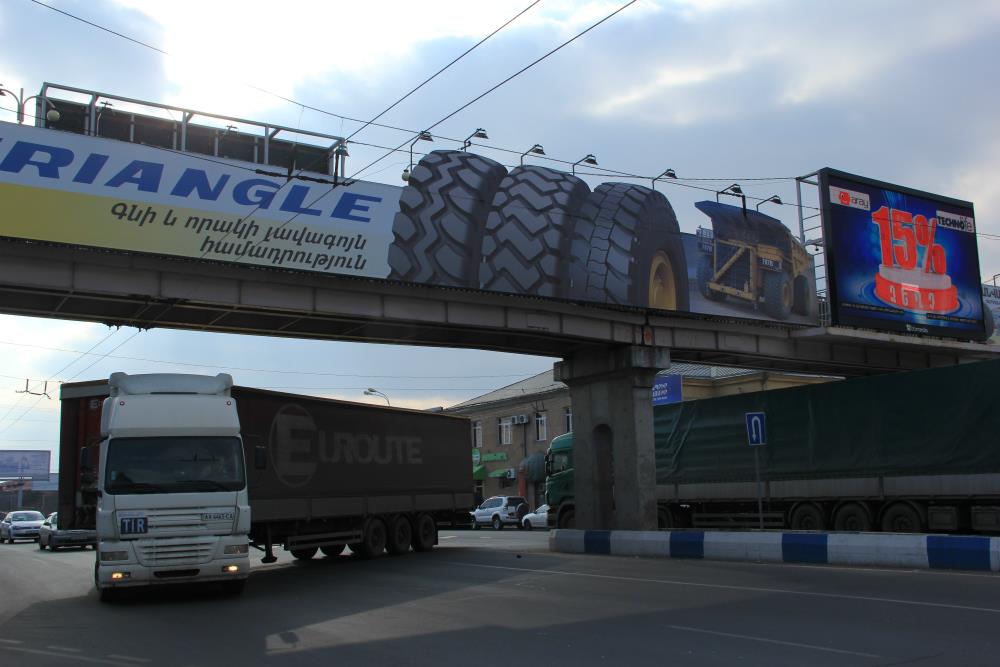A dead-end prospect
A prospect for deeper cooperation with Iran has opened up to Armenia after a deal was reached on Iran’s nuclear program and the West lifted its sanctions.
Armenia is one of those few countries in the region that Iran has no problems in relationship with. In addition, Iran is seeking to tap the European market, and the shortest way to Europe lies through Armenia. Besides, Armenia’s geopolitical location allows Iran to develop commercial ties not only with the European Union and the USA, but also with the EEU (Eurasian Economic Union) countries and Russia.
 Photo: Gevorg Ghazaryan
Photo: Gevorg GhazaryanThe problem lies with the issue of transportation hubs and routes, through which the Iranian products, and most importantly, the energy carriers, will be supplied to the international market. Will Armenia be able to use its potential and become a key stakeholder in the new regional projects involving Iran?
Recently, there has been much talk about construction of a new railway between Armenia and Iran. According to the preliminary estimates, the construction of railway section covering the whole territory of Armenia will cost about US$5billion. However, Armenia has failed so far to find an investor for implementation of this project. As for the Iranian side, it has agreed to finance only its section of the railway.
Earlier this year it was announced about possible transit of Iranian gas to Georgia via Armenia. However, no serious steps have been taken in this regard either.
Gohar Iskandaryan
(an expert on Iran issues, a senior research fellow at the Institute of Oriental Studies of the National Academy of Sciences of Armenia)
Iran aspires to develop economic relations with Armenia, but the Iranian side understands that Armenia doesn’t make decisions on strategic issues independently. Armenia-Iran projects couldn’t be implemented without Russia’s approval. In particular, Russia and Iran are competing in the energy field and, therefore, transit of Iranian energy resources through Armenia to the European market is not beneficial to Russia, since it holds the leading positions there.
It’s highly doubtful that Gazprom energy company, which holds a monopoly on Armenia’s gas market, will allow using its distribution network for transportation of Iranian gas to Georgia, further aiming at Europe. In order to achieve that, it is necessary either to build a new pipeline or to get Russia interested in taking part in this project.
Ruben Mehrabyan
(a political analyst and expert at Armenian Center for Political and International Studies)
The most important thing for Iran is to make sure that development of communication won’t lead to its political dependence. It is building its relations so that these communications could complement and balance each other.
In this respect, communications via Armenia are of strategic importance to Iran, because any possibility of political influence on Iran by Armenia and Georgia are excluded. In addition, neither Armenia nor Georgia have any problems in relations with the West.
Russia views Iran as a serious rival when it comes to hydrocarbon resources, as well as its communication and transport potential. Therefore, Russia tries to prevent the Iranian energy resources from entering the European market. Russia realizes that if Iranian gas gets to Europe through the Armenian-Georgian route, it will lose the leverage over the region. Thus, using its influence on Armenian authorities, Russia is blocking in every possible way any attempts to link the Persian Gulf to the Black Sea through Armenia.
Vahagn Khachatryan
(an economist)
Having been lifted sanctions, Iran is actively seeking options for development of commercial relations with all countries of the region. For Iran, which pursues a policy of diversification and which never builds its commercial relations only with a single partner, Armenia is a promising country. However, at this stage, Armenia is not ready to engage in Iranian projects aimed at Europe.
The available Armenian infrastructure, namely, the transport one, doesn’t meet the international standards. A prospect for construction of Iran-Armenia railway is still vague. To start implementing this project, Armenia requires huge investments, but it doesn’t have them. Neither can it attract the investments due to the national debt, which exceeds US$5billion.
As for the vehicle traffic, this issue could be discussed only upon construction of the North-South highway. And it is highly questionable, whether the latter meets the international requirements.
Published: 27.09.2016




















